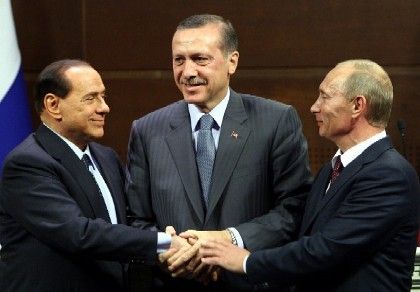News, Etc.
Less than a month after Turkey signed the partnership agreement for the Nabucco pipeline project which is designed to break the Russian monopoly in energy supplies to Europe, Russian Prime Minister Vladimir Putin and his Turkish host Tayyip Erdogan announced in Ankara plans for intensive cooperation in oil and natural gas.
Erdogan hosted both Putin and Italian Prime Minister Sylvio Berlusconi this week while his ministers and bureaucrats signed some 20 protocols envisaging cooperation between Turkey and Russia in the fields of energy, customs, trade, transportation, etc.
According to political circles Berlusconi was the politician who brokered the deal between Turkey and Russia, so he decided to make himself present while the Turks and the Russians were sealing their agreement.
Putin announced that Russia will supply oil to Samsun-Ceyhan pipeline and cooperate with Turkey in the South Stream project which will transport Russian oil and natural gas under the Black Sea. Turkey also agreed to allow the Russians drill oil in Turkey’s Exclusive Economic Zone (EEZ) in the Black Sea.
In exchange for the Russian oil and gas, Erdogan presented his guest with a project to build a nuclear power plant in Turkey. Putin announced during their joint press conference in Ankara that a Russian-Turkish consortium has won the tender for a nuclear power plant and its construction will be beginning shortly.
While the leaders were showing happy faces in the conference chamber, environmentalists were demonstrating outside against plans to build a nuclear power station in Turkey. As expected, they were manhandled by police, both uniformed and plain clothes. Especially an elderly lady demonstrator was pulled to the ground by a hefty police officer who sat on her beating her up. The scene caused onlookers to react.
Inside the conference hall the President of Calik Holding, Ahmet Calik and his CEO Berat Albayrak who also happens to be Prime Minister Erdogan’s son-in-law were also present. Calik Holding has been awarded the construction of the Samsun-Ceyhan pipeline project in cooperation with the Italian oil company ENI.
Erdogan pointed out that Turkey is Russia’s 5th trade partner while Russia tops the list of Turkey’s partners in foreign trade.
“Development of our already growing relations with Russia is one of our prime targets in foreign policy. Energy is the most concrete and important element of cooperation between our two countries,” said Erdogan.
“We have planned our work under three chapters; oil, natural gas and cooperation in nuclear energy,” he added. He also announced their decision to come together at least once a year with Putin.
“Our developing relations have given rise to a need for Turkish youth who should be fluent in the Russian language. That is why I proposed to Prime Minister Putin for his cooperation for opening a Turkish-Russian university. He welcomed my proposal warmly,” Erdogan announced.
Putin for his part said that the three leaders have decided to go into wide-ranging cooperation.
“Considering our newly-found oil reserves in the Caspian Sea, we have found the Samsun-Ceyhan pipeline project very useful and we have decided to support it,” Putin said.
Necdet Pamir, a member of the National Committee of World Energy Council (WEC), observed that Turkey’s participation at the Russian South Stream project might trigger negative reaction both from the USA and the European Union.
“To enter both the Nabucco and South Stream projects at the same time is not a very correct thing to do. But, the government might have consented to the South Stream project in order not to antagonize Russia,” said Pamir.
Pamir also explained that Bulgaria has recently frozen Russian energy projects in that country, such as the Burgas-Alexandroupolis pipeline project. “Putin probably wanted to send a message to Bulgaria by getting Turkey’s support for the South Stream project,” he said.
Nabucco Project consists of a total of 3,282-kilometer pipeline that will connect Asian and Middle Eastern oil fields to Central Europe passing over Turkey, Bulgaria, Romania, Hungary and Austria. The project bypasses Russian-controlled territory with the aim of breaking Russia’s monopoly to energy supplies to Europe. However, experts say that there is not enough reserves in the countries planned to supply the pipeline. USA objects to Iran’s participation in the project in which the prime suppliers are envisaged to be Kazakhstan, Azerbaijan, and Turkmenistan.

